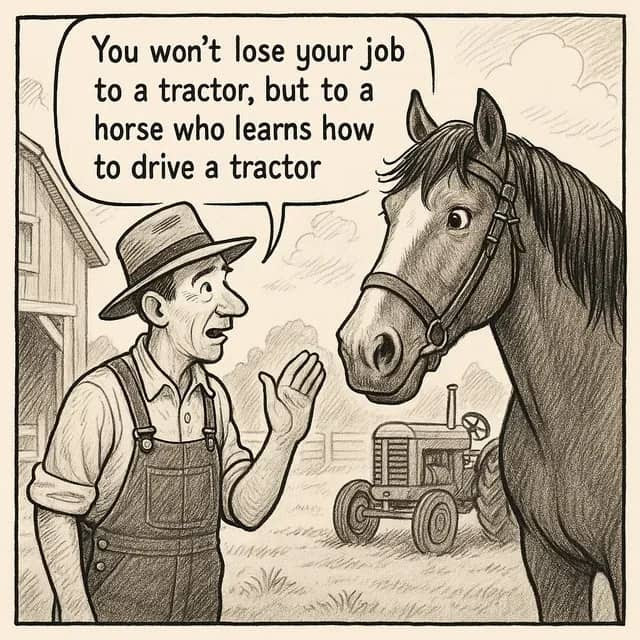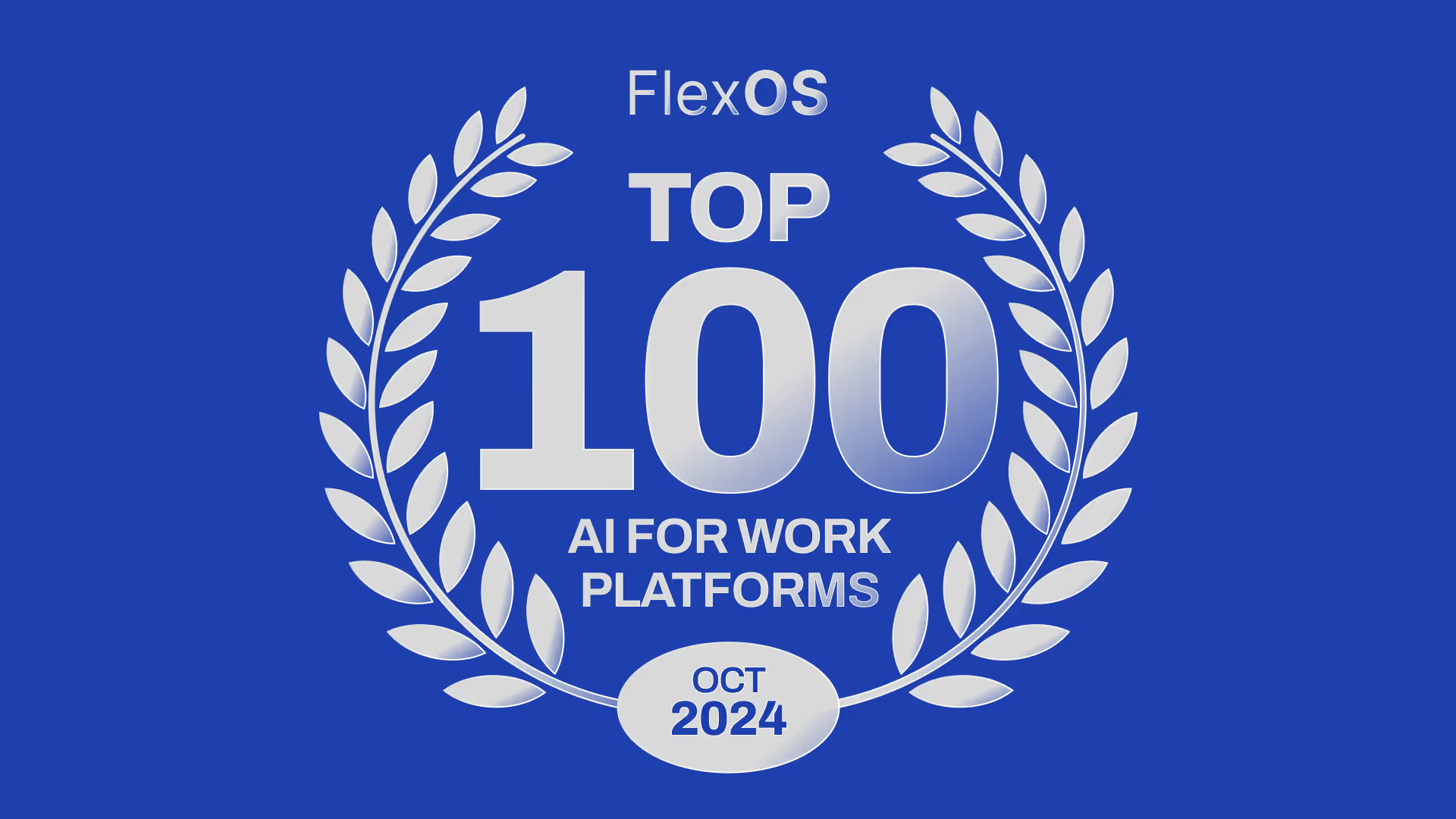I wrote my first article on how AI will replace humans in May 2023, almost 2.5 years ago now. In April 2024, I shared even more roles AI could take over, while in August last year, I highlighted how AI could, in particular, make remote workers vulnerable.
My latest on this topic was in April, where I said in no uncertain terms that you'd better start to think about how you can steal your own job before someone else (or AI) does so. I quoted Henrik Jarleskog from Sodexo, who added:
“Everyone will compete on the same field with the same tools as everyone will have access and it will be easy to use.” – Henrik Järleskog, Sodexo
Due to Genius on Demand, We Won’t Be Missed
Two new reports paint a believable picture of a future where AI trumps human intelligence, and we should get into them.
One, “We Won’t be Missed: Work and Growth in the Era of AGI,” is a paper on how AGI will automate all bottleneck work (essential for growth) while some accessory work (non-essential) may be left to humans.
The other, “Genius on Demand: The Value of Transformative Artificial Intelligence,” focuses on AI geniuses, how they will displace routine workers, and cause human geniuses to specialize in the most novel, challenging questions.
Across these papers, the authors explore how the emergence of "Genius on Demand" AI systems fundamentally reshapes knowledge work:
- "Genius on Demand" AI systems, described as providing "a country of geniuses in a data center," fundamentally alter the economics of knowledge work.
- This technology focuses on knowledge work, where “value stems from the quality of decisions made under uncertainty”.
- Because AGI makes it feasible to perform all economically valuable work using computation, routine knowledge workers who only apply existing knowledge are highly vulnerable to displacement by AI systems.
- In the short run, human geniuses specialize in questions that are furthest from existing knowledge, where their comparative advantage over AI geniuses is greatest. It’s also where we may see human-AI Trust, Integration, and Taste roles.
- In the longer run, the availability of AI geniuses at scale could lead to the complete displacement of routine knowledge workers, as these AI geniuses provide higher value than routine workers at a fraction of the cost, especially on “bottleneck work,” tasks defined as essential for sustained economic growth.
- In a further “post-labor economy”, the share of labor income in GDP nears zero, and all income goes to the owners of computing resources. It’s why Microsoft and others invest so much in their AI data centers, and why Sam Altman is a proponent of UBI.
- “Accessory work,” on the other hand, which is non-essential to growth, may be left untouched by AI and assigned exclusively to humans. This is where “human is the new luxury,” as my colleague Antony Slumbers would say.
Why This Matters
Whether this is what the future looks like or even just 10% of it, we’re in for significant disruption.
The idea that just learning some AI tools will help us survive that change seems wishful at best.

It seems obvious that we’ll experience at least some of these issues:
- Displacement of Routine Work: If your current role or that of your organization involves primarily routine knowledge work (applying existing knowledge or drawing inferences), it may be completely displaced in the long run, especially if AI efficiency approaches human genius efficiency.
- Decoupling of Wages from Growth: In the long run, wages for human labor stop growing and remain bounded above by the value of the compute needed to replicate their work. The share of labor income in GDP would then converge to zero. If you rely on skill premiums based on the scarcity of performing bottleneck tasks, those premiums will evaporate.
- Transition Instability: The transition may be smooth, but if technological feasibility (AGI development) binds rather than compute scarcity, the transition will be "jagged, uncertain, and haphazard". Wages for specific skill sets can drop suddenly when the work is automated, even if they were earning a high premium just before displacement.
How to Prepare for a Future Where AI Outperforms Us All
So what does this mean? Should we all prepare to become plumbers, as AI godfather Jeffrey Hinton recently shared?
Not quite, but besides building a solid understanding and practice of AI and agents (we can help), the authors would also urge you to think about:
1. Shifting Work Focus to the "Far Frontier" (Genius Specialization)
If you are currently a "genius worker" (one who creates new knowledge rather than applying existing knowledge) or manage such workers, the short-run introduction of AI geniuses mandates specialization in the most novel and challenging questions.
- Focus on Comparative Advantage: Human geniuses maintain their greatest advantage over AI geniuses at positions furthest from the known knowledge point. Your organization should direct its human intellectual capital to those questions where the cost of creating new knowledge is highest.
- Embrace Novelty: Human geniuses could become ultra-specialized in handling the most novel, challenging, and distant questions. Tangibly, this means directing R&D, strategic planning, or expert time to problems beyond the domain boundaries where routine workers (and likely early AI) cannot function at all.
2. Re-optimize Knowledge Work Allocation (Managerial Strategy)
As the manager or “allocator of intelligence,” your primary task will be routing questions optimally to maximize total value.
- Anticipate Routine Displacement: In the long run, plan for the AI genius capacity to displace routine work entirely. This requires adjusting your routing rule to assign the bulk of knowledge application to AI, saving scarce human genius capacity for the extreme frontier.
- Utilize AI for Previously Unanswered Questions: AI geniuses will expand the total domain of questions that can be addressed by providing answers to previously unanswered questions. You should strategically deploy AI to tackle questions that previously couldn’t have been solved.
- Prioritize Scientific Work: Recognize the long-run growth model where output scales with compute, and technological progress scales with compute allocated to science. To maximize welfare, the economy should prioritize scientific bottlenecks early in the transition to rapidly expand production knowledge. As a leader, allocate resources (compute and human genius capacity) toward knowledge creation that accelerates technological advancement.
3. Prepare for Economic Stability and Non-Essential Roles
Given that wages will be capped and human economic contribution will decline as a share of GDP:
- Identify Accessory Work Niches: If hyper-specialized genius work is not your path, consider preparing for roles in accessory work: tasks non-essential to growth but potentially untouched by automation. Examples include arts and crafts, literature, hospitality, fine dining, or care work/therapy. These roles offer continuity and stability because the computational resources required to replicate the "human touch" may remain economically impractical.
- Advocate for Income Redistribution: Since income will accrue predominantly to those who own or control computational resources, leaders should participate in discussions or policy advocacy concerning how to share the income generated by compute, such as through universal dividends or treating compute as a public resource.
- Decouple Meaning from Economic Utility: Recognize that in the AGI economy, human work no longer drives progress or improves living standards; humans "won't be missed" economically. Prepare personally and institutionally to help people find meaning and purpose outside of economically essential labor.
The Bottom Line: Become Unmissable
The reports are blunt: routine knowledge workers risk becoming missable.
If AI can outperform us at scale, the only way to stay in the frame is to become unmissable by moving toward the frontier of novelty, taste, and trust.
This means stepping beyond the familiar paths of applying existing knowledge and instead carving out unique contributions in spaces AI cannot yet reach.
If economic power will concentrate in the hands of compute owners, wages will flatten. The antidote to being sidelined is then to ensure your work is positioned where it cannot be ignored.
To practice this, strategically redesign your “portfolios of effort.” Route repeatable, codified tasks to AI and protect scarce human attention for the hardest, most original questions.
Specialize in problems furthest from consensus, cultivate comparative advantage in judgment and integration, and lean into accessory work where the “human touch” remains a luxury.
Becoming unmissable is not about clinging to old roles but about shifting deliberately to the edges of knowledge, creativity, and meaning, where AI is least capable and human presence is most valued.











